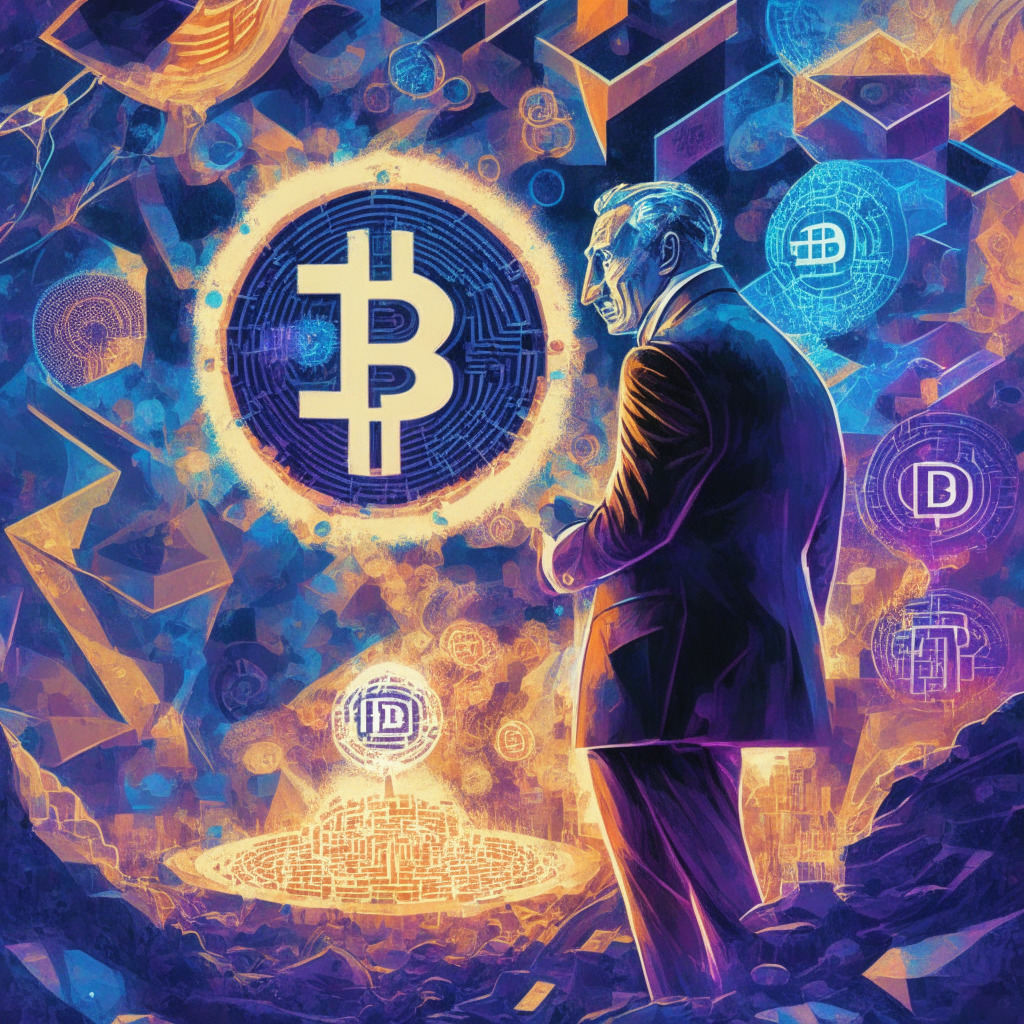Chainlink recently made an unannounced change to its multi-signature wallet. The number of signatures required for transactions was reduced, which raised concerns about the decentralization risk of the blockchain platform. Despite clarifications from Chainlink, the skepticism remains and highlights the often unresolved trade-off between absolute decentralization and absolute security in the blockchain world.
Search Results for: Signature
Crypto Tokens for Digital Signatures: A Bold Leap for India Amid Crypto Ambiguity
India’s Ministry of Electronics and Information Technology plans for a web browser that will allow users to use crypto tokens for digital signatures. This, despite the absence of legislative guidelines for cryptocurrency, marks a compelling development in India’s ambiguous stance on cryptocurrencies.
Securing Crypto Assets: Exploring Casa’s Multi-Signature Vaults for Bitcoin and Ethereum
Casa introduces an Ethereum vault to its platform, offering multi-signature security for both BTC and ETH, aiming to provide secure custody solutions. This expansion emphasizes the importance of self-custody solutions, fostering trust and growth in the cryptocurrency community.
Binance’s Ties to Signature and Silvergate Banks: Unraveling the SEC Lawsuit and Its Impact on Crypto
The SEC’s recent court documents reveal billions of dollars in Binance-related funds flowed through Signature Bank and Silvergate Bank, raising questions about Binance’s relationship with banks. The SEC found Binance, CEO Changpeng Zhao, and BAM Trading Services held accounts at both banks and alleges that millions of dollars from Binance-related accounts were commingled in Merit Peak’s accounts.
Collapse of Signature Bank: Crypto Scapegoat or Executive Greed? Debating the True Culprit
Former Signature Bank chairman Scott Shay faces criticism for blaming the cryptocurrency industry for the bank’s collapse, while potentially collecting millions in bonuses and stock options. Senators Warren and Lummis argue that current laws allow executives like Shay to recklessly crash banks, jeopardizing the economy, and demand clawbacks of “crazy paychecks.” Blockchain understanding remains crucial amidst evolving digital asset complexities.
Did Crypto Cause Signature Bank’s Collapse? Debating Reasons and Regulator’s Intentions
Two executives from the defunct Signature Bank testified before Congress, asserting that the bank could have recovered despite customer withdrawals of $16 billion. Questions about the role of crypto in the bank’s shutdown remain unanswered, with regulators denying that it was related to crypto exposure.
Collapse of Signature Bank: Crypto Exposure, Regulation, and Lessons for the Future
The collapse of Signature Bank highlights the potential systemic risks posed by crypto-linked banking activities and the importance of stringent regulatory oversight. It serves as a cautionary tale about unchecked growth, inadequate risk management, and the need for proper risk management practices in the volatile and rapidly evolving crypto industry.
Signature Bank Collapse: Crypto Exposure’s Role and Lessons for Future Regulations
FDIC Chairman Martin J. Gruenberg suggests that the failure of Signature Bank may be partly due to its inability to comprehend risks tied to cryptocurrencies and inadequate management. While the direct impact of crypto exposure on the bank’s collapse remains unclear, it highlights the need for closer scrutiny on crypto market regulations.
Exploring the Role of Crypto in Signature Bank and Silicon Valley Bank Failures
The United States Government Accountability Office (GAO) report cites poor governance and unsatisfactory risk-management practices as primary causes of Signature Bank’s failure in March, acknowledging the bank’s exposure to the crypto industry as a potential contributing factor. The continued debate on the role of crypto in failed banks’ circumstances directly affects the fintech and regulatory spaces.
Signature Bank’s Collapse: How Poor Management and Crypto-Connections Led to a Banking Breakdown
The collapse of Signature Bank of New York (SBNY) has been a hot topic of […]
Cryptocurrencies in Conflict Resolve: Israeli Cyberspace Crackdown vs. Crypto Aid Israel
The Israeli police cyber unit and Binance tackled Hamas’ attempts to raise funds via cryptocurrency while Crypto Aid Israel, supported by Fireblocks, was established to receive cryptocurrency donations for displaced citizens securely. The growing cooperation could potentially link cryptocurrency assets and traditional banking, crystalizing a hybrid financial future vision.
Crucial Crypto Updates: The Bitcoin Slump, Crypto Aid Israel and The Rise of BitVM
Bitcoin’s value hovers at $27,653 as Robert F. Kennedy Jr, a crypto enthusiast, vies for presidency as an independent, proposing the reinforcement of the US dollar with Bitcoin among other assets. Cryptocurrency organizations, including Fireblocks, offer aid in the midst of the Israel crisis, suggesting possible integration of crypto in traditional finance systems. Robin Linus unveils BitVM, potentially importing Ethereum-level smart contracts to the Bitcoin sphere.
Smart Contracts on Bitcoin: The Future of Blockchain or an Overreaching Gamble?
The recent “BitVM: Compute Anything on Bitcoin” white paper by ZeroSync’s project lead, Robin Linus, proposes a new way to implement complex off-chain smart contracts on Bitcoin. Based on a Turing Complete system, this method would broaden Bitcoin’s operations to include applications like tactical games verification, bridging BTC to foreign chains, and constructing prediction markets.
The Unforgiving Nature of Blockchain: Lessons from Gitcoin’s $460,000 Mishap
“Gitcoin, a platform funding Web3 builders, recently lost approximately $460,000 due to a mistaken transfer to an unrecoverable blockchain contract address. Despite the loss, the incident both highlights the inherent risks in blockchain technology and underscores the urgent need to enhance usability and safety in the crypto landscape.”
Riding the Crypto Wave: Basel Committee Pushes for Bank Disclosure and Regulation
The Basel Committee on Banking Supervision might soon impose disclosure requirements for banks’ crypto assets, underlining the risks involved in drastic shifts in finance and technology. Amid discussions about crypto regulations, it’s crucial to balance embracing technological advancements and mitigating their associated risks. A consultation paper on crypto asset exposure disclosure is expected soon.
Mandating Full Crypto Holdings Disclosure: Basel Committee’s Bold Move towards Transparency
The Basel Committee on Banking Supervision intends to mandate banks to disclose their cryptocurrency holdings fully, aiming to bolster transparency. They will detail disclosure requirements for bank’s exposure to crypto assets, with the objective to prevent potential risks within the financial ecosystem. Using this approach, the committee hopes to create increased crypto transparency.
Decoding CryptoNight: Champion of Mining Democracy or Falling Giant?
The CryptoNight mining algorithm, a feature of the CryptoNote protocol, aims to prevent the centralization of mining power by allowing CPUs and GPUs to mine blocks. Despite criticisms and ASICs adapting, it remains a successful tool advocating privacy and fairness in mining.
Rosbank’s Bold Endeavor: Embracing Digital Ruble Amidst Security Concerns and High Costs
“Rosbank, a trailblazer in the digital currency revolution, invested $1.6 million on integrating its systems with the digital ruble merely two months into the CBDC pilot. Emphasizing on secure transactional gateways, engaging complex cryptography solutions, and investing in specialized expertise, Rosbank stands resolved to overcome challenges of safety concerns, technological hurdles, and costly investments in this digital financial infrastructure.”
Unveiling the Veil: Chainlink’s Multisig Reduction and Other Noteworthy Crypto Developments
Chainlink’s change to its multisig wallet practices has raised questions around transparency and accountability in the crypto world. Meanwhile, Mixin Network offers a bounty to recover exploited funds, Uniswap seeks increased funding, and Curve Finance’s founder reduces his debt. Progress, despite controversy, highlights the resilience and potential growth of the DeFi sector.
Embracing Digital Assets: A Rewarding Yet Daunting Shift for Traditional Financial Institutions
Adding digital assets to traditional portfolios has its unique opportunities and challenges. Navigating the novel landscape of digital assets requires risk management, understanding of blockchain technology, robust cybersecurity protocols, and a focus on legal compliance amidst evolving regulations. Embracing digital assets is a transformative journey redefining conventional financial systems.
Bank Ruin and Crypto Scam: A Cautionary Tale from Kansas Heartland
“In a blow to Heartland Tri-State Bank, its CEO lost millions in a cryptocurrency scam. This incident highlights the risks attached to crypto investments, ultimately leading to the bank’s insolvency. The event underscores the need for regulation and vigilance in the crypto landscape.”
Decoding Chainlink’s Multisig Wallet Controversy: Centralization Concerns Vs. Market Performance
Chainlink recently altered its multisig wallet’s signature rule, shifting from a 4-of-9 to a 4-of-8 requirement. Critics suggest this change and removal of a wallet address may indicate potential centralized control risking the DeFi ecosystem’s integrity. Regardless, Chainlink maintains its utility in DeFi projects and its token value keeps growing.
Massive Ethereum Movements: Buterin’s Wallet Activity Sparks Market Speculation
“A series of large Ethereum transactions linked to Vitalik Buterin have been detected, including a 400 ETH transfer to Coinbase. These deposits, ranging over 10 days and amounting to nearly $3.94 million, have sparked speculation about a potential sell-off and its impact on the ETH price.”
Bridging Artistry and Blockchain: The Rise of Generative Art in the Crypto Sphere
“William Mapan, a noted NFT artist, likens blockchain-based generative art to drawing guided by the roll of dice. A harmonious blend of predetermined rules and randomness, this form of artistry aims to evoke emotions and trigger personal memories in the audience. Despite market fluctuations, the allure of the unique union of blockchain technology and artistic creativity persists.”
AI Revolution: The Promising Rise and Potential Perils of Artificial Intelligence
The global AI market growth is seeing a significant surge, with 50%-60% of all organizations globally utilizing AI-powered tools. While AI assistants offer numerous benefits like ease of blockchain decoding and operation of smart contracts, there are potential drawbacks including security loopholes and job dilution. It’s essential its use is carefully regulated.
Binance.US and SEC Tussle: A Case of Compliance, Transparency and Potential Risks in Crypto
“The SEC has accused Binance.US of non-cooperation in an ongoing investigation, alleging that the crypto exchange failed to provide necessary documents. Binance.US’s use of Ceffu, wallet custody software, also raised concerns, with SEC fearing the potential diversion of funds abroad.”
Escalating Tensions Between SEC and Binance.US: Pros, Cons, and the Underlying Blockchain Battle
The U.S. Securities and Exchange Commission (SEC) accuses Binance.US and BAM of possibly violating federal securities laws due to their staking, clearing, and brokerage services. The SEC’s concern revolves around Binance.US’ reliance on a custody provider, Ceffu, potentially leading to violations of prior agreements. Binance.US denies any wrongdoing, while regulation pressure continues to increase. This situation illustrates a broader discussion surrounding crypto regulation nuances, transparency, investor protection, and maintaining decentralization.
Hong Kong and Crypto: Friend or Foe in the Making? Debating the City’s Crypto-Future
“Hong Kong is solidifying its position in the cryptocurrency global stage, with a warm reception to crypto projects and a stable policy framework that fosters cryptocurrency growth. However, concerns exist about the long-term stability of this friendliness amid potentially unstable regulatory shifts, political unrest, and other unforeseen events.”
Blockchain Revolution: The Dual Stance of BOE’s New Deputy on Crypto Stability and Risk
Sarah Breeden, the incoming deputy governor of financial stability at the Bank of England, believes that cryptocurrencies are currently not a significant threat to financial stability. Though highlighting risks linked with digital assets, she underlines the potential of crypto technology in bolstering financial systems.
Balancing Skepticism and Hope: Insights on the Crypto World from a Central Banker
“Sarah Breeden, the incoming deputy governor of the Bank of England, voices concern over potential financial instability posed by cryptocurrencies. While acknowledging the benefits of blockchain technology, she emphasizes the need for a global regulatory approach to manage cryptos’ volatility and potential economic implications. She sees value in a central bank digital currency as an anchor, while warning against potential privacy issues.”
Examining Casa’s Newest Ethereum Feature: Privacy Boost vs Public Transaction Visibility
Casa’s new transaction relay feature aims to provide more privacy for its Ethereum users. While this innovation is exciting, it can make Ethereum addresses linked to Casa publicly viewable, raising privacy concerns. However, the use of an ETH Pay Wallet can serve as a relay to transact from a vault, mitigating this issue.
Qredo’s Crypto Winter Survival: Staff Cuts, Refocusing Efforts and Ramped-up Security
“Crypto infrastructure provider Qredo is reportedly laying off around 50 staff members, including key executives, reducing the firm’s headcount to around 130. The layoffs are part of a resizing strategy, an attempt to endure the difficult crypto market while refocusing efforts to save approximately 50% of its expenses.”






























